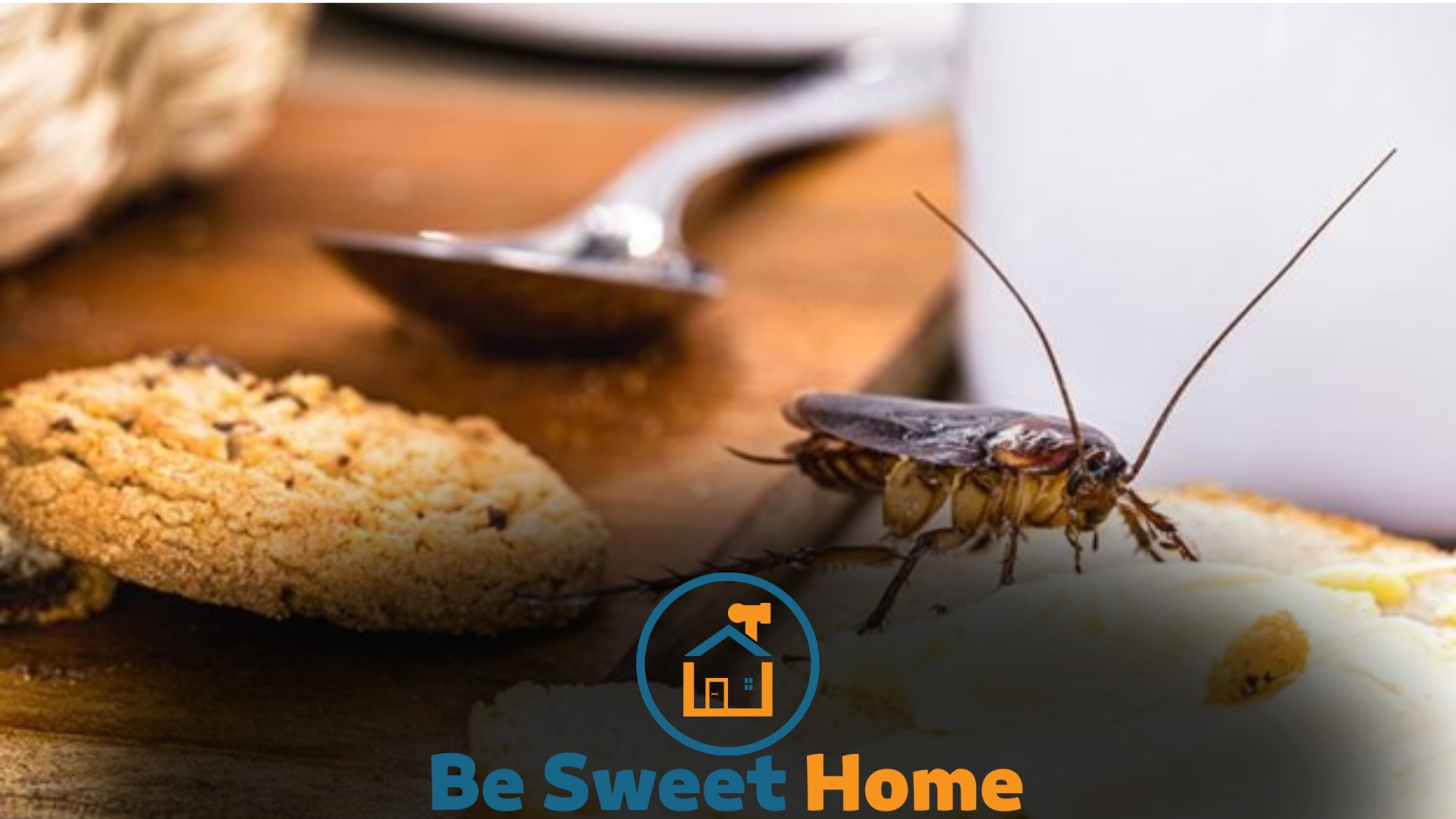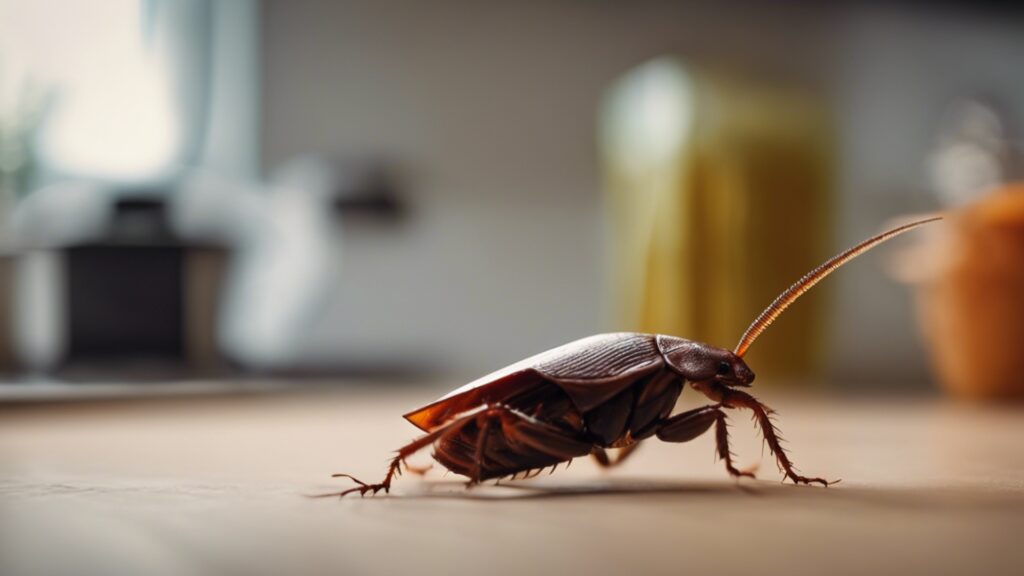

Upon spotting a cockroach in your kitchen, immediately clean the area and set traps or use bait. Seek out and seal entry points to prevent further infestation.
Discovering a cockroach in your kitchen can trigger an alarm and demand urgent action. These unwelcome guests are not just a nuisance; they pose health risks as they can carry bacteria and allergens.
A clean kitchen is your first defense, ensuring crumbs and spills are promptly dealt with.
Employing traps or baits strategically can curb the immediate problem, while a long-term solution requires sealing cracks and crevices that serve as entry points.
Diligence in maintaining kitchen hygiene and regular inspections for signs of pests is crucial in keeping these intruders at bay.
Taking swift and decisive actions will help protect your home from the dreaded cockroach and the potential risks they bring to your environment and well-being.
The Shocking Encounter: Spotting a Cockroach
There’s that heart-skipping moment when eyes meet antennae. A cockroach is scurrying across your kitchen counter. These unwanted guests are not only unsightly but can pose health risks. Acting swiftly is crucial to prevent an infestation.
Let’s explore the steps to take when you spot a cockroach in your kitchen.
Remain Calm and Assess the Situation
Your initial reaction to a roach sighting may be panic or disgust. Breathe deeply and stay calm. You need a clear mind to handle the situation effectively.
Quick and careful observation is your first step. Look for where the cockroach darted off to or if there are more lurking.
- Switch on the lights to get a better view.
- Inspect common hiding spots like under sinks, appliances, and shelves.
- Note any possible entry points the roach could have used.
- Check for droppings or egg cases to determine the infestation level.
Identify the Cockroach Type
Identifying the type of cockroach is essential. Different types require different strategies. Some are more prone to causing infestations. The German cockroach, for instance, is notorious for rapid reproduction.
| Type | Features | Notes |
|---|---|---|
| German Cockroach | Looks like the German variety, but it can fly | Very common, fast breeder |
| American Cockroach | Larger, reddish-brown | Often found in warm, damp areas |
| Asian Cockroach | Looks like the German variety, but can fly | Attracted to light |
| Oriental Cockroach | Large, dark brown to black | Known as water bugs, prefer cooler climates |
Immediate Response Tactics
Discovering a cockroach in your kitchen can unsettle anyone. Your immediate response matters. These quick actions help prevent an infestation. Knowing what to do right away will safeguard your home.
Capturing or Killing the Intruder
Dealing swiftly with the roach is crucial. Use a glass jar to trap the intruder. Slide a piece of paper underneath to secure it. Consider non-toxic sprays if capturing is not an option.
Squashing is effective, but it’s messy. A vacuum cleaner with a bag can also work. Seal the bag and dispose of it immediately. Always clean the area thoroughly after dealing with the cockroach.
Natural Repellents and Quick Fixes
Use these easy and safe methods to deter cockroaches:
- Bay leaves: Place crushed leaves in corners. Their scent repels cockroaches.
- White vinegar: Clean surfaces with a vinegar solution. It acts as a natural deterrent.
- Baking soda: A mix of baking soda and sugar can kill cockroaches when ingested.
Seal off entry points with caulking. Regularly dispose of garbage and keep your kitchen crumb-free.
Cleaning Spree: Minimizing Attractions
Finding a cockroach in your kitchen can send shivers down anyone’s spine. The best defense is a good offense when it comes to these creepy crawlies. Embark on a cleaning spree to make your kitchen less attractive to these unwanted guests.
Reduce cockroach appeal by focusing on three critical actions: eliminating food sources, sealing entry points, and adhering to regular maintenance.
Eliminate Food Sources
Cockroaches come searching for food. Keep them at bay by taking proactive steps:
- Clean crumbs promptly after meals.
- Store food in sealed containers.
- Empty garbage bins regularly.
- Sweep and mop floors often to remove residue.
Seal Entry Points
Prevent cockroaches from making your kitchen their home by:
- Using caulk to seal cracks and crevices.
- Fixing any leaks to avoid water sources.
- Checking windows and doors for gaps.
Regular Maintenance Tips
Maintain a routine to deter cockroach infestations. Remember these tips:
| Task | Frequency |
|---|---|
| Deep clean appliances | Monthly |
| Inspect under sinks | Bi-weekly |
| Declutter | Ongoing |
- Stick to a cleaning schedule.
- Reduce clutter to eliminate hiding spots.
- Consider professional pest control for regular inspections.
Chemical Warfare: Using Insecticides
Spotting a cockroach scuttling across your kitchen floor can start a battle against these unwelcome intruders. One effective weapon is insecticides. You can reclaim your space with a proper strategy and the right type. But remember, careful use is crucial to protect your health and environment.
Choosing the Right Insecticide
Not all insecticides are equal when confronting cockroaches. It’s essential to choose one designed specifically for these pests. Here’s how:
- Read labels for active ingredients like cypermethrin or imidacloprid.
- Opt for baits, sprays, or traps based on the infestation size.
- Consider eco-friendly options that target roaches effectively.
A table of common active ingredients might help you decide:
| Active Ingredient | Type | Effectiveness |
|---|---|---|
| Cypermethrin | Spray | High |
| Imidacloprid | Gel | High |
| Boric Acid | Powder | Moderate |
Safety Precautions When Spraying
Using insecticides demands safety first. Protect yourself and others with these steps:
- Wear gloves and a mask to prevent direct contact and inhalation.
- Keep the area well-ventilated during and after spraying.
- Evacuate pets and children from treated areas for specified times.
Always store insecticides in original containers, away from food and out of reach of children. Always follow the instructions on the label for the safest and most effective use.
Long-term Prevention Strategies
Spotting a cockroach in your kitchen can often signify an underlying problem requiring more than a quick fix. Implementing long-term prevention strategies ensures that these unwelcome visitors don’t feel at home in your space.
Let’s look into the practices that can make your kitchen an unattractive haven for cockroaches.
Adopting a Clean Kitchen Routine
A proactive approach to kitchen cleanliness can make all the difference. Start by:
- Wiping down surfaces after each use.
- Sweeping and mopping floors to remove food particles.
- Regularly taking out the trash to avoid odors and residue.
- Using a vinegar and water solution for cleaning. Cockroaches dislike the smell.
- Cleaning behind appliances where crumbs and grease can accumulate.
Maintain a routine that includes these tasks to keep cockroaches at bay.
Strategic Storage Solutions
Proper storage is your next defense against a cockroach infestation. Try these tactics:
- Store food in airtight containers. Cockroaches can’t eat what they can’t access.
- Keep your pantry organized and clutter-free. This makes it harder for pests to hide.
- Ensure no water is left standing. Use dehumidifiers in damp areas.
- Seal gaps in walls and around pipes. Cockroaches can enter through the tiniest holes.
Your kitchen must be a fortress against pests, and strategic storage plays a huge role.
When To Call the Professionals
Encountering a cockroach in your kitchen is unsettling, prompting immediate action. Recognizing when to involve professionals is crucial for an effective solution.
Let’s explore the signs indicating a serious infestation and tips on selecting the right exterminators.
Signs of Infestation
If you notice any of the following signs, it’s time to contact a pest control service:
- Multiple sightings: Spotting several cockroaches, especially during the day, suggests a larger problem.
- Excrement: Look for small pepper-like droppings in drawers and corners.
- Egg cases: Oval-shaped egg cases, or oothecae, often signal a breeding population.
- Odor: An unusual, musty smell can hint at a hidden infestation.
- Damage: Chewed food packages or organic materials are telltale signs.
Selecting Extermination Services
Selecting a qualified exterminator is vital to ensure a pest-free kitchen. Consider these steps:
- Seek recommendations from friends or read online reviews.
- Check for licenses and certifications to ensure professionalism.
- Compare services, guarantees, and treatments offered by various companies.
- Request quotes and understand the scope of the extermination process.
- Choose a service provider with a proven track record for safety and effectiveness.
Remember, timely intervention by pest control experts can prevent health risks and protect your home from damage.

Frequently Asked Questions
Can Cockroaches in the Kitchen Cause Illness?
Cockroaches can potentially spread bacteria and viruses, leading to illnesses such as food poisoning and diarrhea.
How To Prevent Cockroaches in Kitchens?
Eliminate food scraps and standing water, seal cracks, and maintain cleanliness to deter cockroach infestations.
What Kills Cockroaches Instantly At Home?
Boric acid, insecticide sprays, and bait traps effectively eliminate cockroaches at home.
Are Cockroaches a Sign of Dirty House?
Not necessarily; cockroaches can invade any space, but a dirty house offers more food sources and hideouts.
Is It Normal To Have Cockroaches in the Kitchen?
It’s not uncommon, but it’s a sign to take action on pest control and kitchen sanitation practices.
Conclusion
Encountering a cockroach in your kitchen can be unsettling. Remember, prompt action is the key to prevention. Seal entry points and keep your space clean to deter these pests. If infestations persist, consider professional extermination. Your home deserves to be a pest-free sanctuary.







